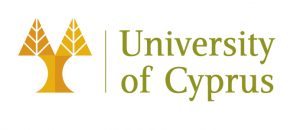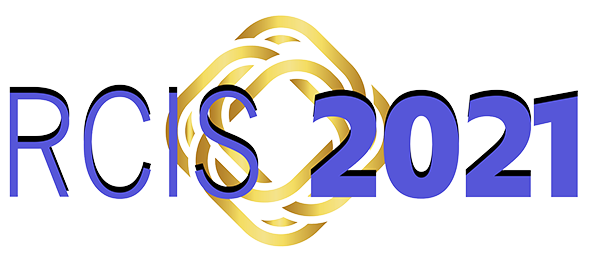February 19 , 2021
March 19, 2021
12 Mar 2021 – 11 May 2021
Anna Perini
FBK, Italy
Email: perini@fbk.eu
Registration - Accommodation
EASY CONFERENCES
Website: www.easyconferences.eu
Email:info@easyconferences.eu
RCIS 2021 Program
All times depicted below are in the GMT +2 Time Zone
| Tuesday 11/5 | Wednesday 12/5 | Thursday 13/5 | Friday 14/5 | |||||
| 10:00-10:30 | AKAMAS Conference Opening |
|||||||
| AKAMAS | LEDRA | AKAMAS | LEDRA | AKAMAS | LEDRA | AKAMAS | LEDRA | |
| 10:30-12:00 | Session 1: Business & Industrial processes |
Doctoral Consortium | Session 3 Information Security and risk management | Research Projects @RCIS 21 | Session 6: Information systems and their engineering | Tutorial 2: Fractal Enterprise Model (FEM) and its Usage for Facilitating Radical Change in Business Models | Session8: Business & Industrial processes |
Tutorial 3: Supporting the Information Search and Discovery Process with the Bash-Shell |
| 12:00-13:00 | Lunch | |||||||
| AKAMAS | AKAMAS | LEDRA | AKAMAS | AKAMAS | ||||
| 13:00-14:30 | Keynote 1: Augmenting creativity to resolve global challenges: An information systems approach | Session 4: User centered approaches |
Tutorial 1: Introduction to the Theory and Practice of Argument Analysis Read More | Keynote 2: Requirements Engineering for Social
Crises |
Panel: From Face-to-Face to Online Teaching: the Requirements Perspective | |||
| Neil Maiden | Jennifer Horkoff | chair: Monique Snoeck | ||||||
| 14:30-14:45 | Break | |||||||
| AKAMAS | LEDRA | AKAMAS | LEDRA | AKAMAS | LEDRA | AKAMAS | LEDRA | |
| 14:45-16:00 | Session 2: | Doctoral Consortium | Session 5: Data science and decision support | Posters & Demos (session 1) | Session 7: Data and information management |
Posters & Demos (session 2) | Session 9: Data science and decision support |
Posters & Demos (session 3) |
| Domain specific information systems engineering | ||||||||
| AKAMAS | AKAMAS | |||||||
| 16:00-16:30 | Welcome, online drinks | Award + Conference closing and RCIS 2022 announcement |
||||||
Tuesday 11/5 |
Wednesday 12/5 |
Thursday 13/5 |
Friday 14/5 |
Tuesday, 11/05/2021
| 10:00-10:30 | Conference Opening |
|
| 10:30-12:00 |
AKAMAS MT Session 1: Business & Industrial processes Chairs: Amin Jalali, Dominik Bork Robotic Process Automation in Knowledge-Intensive Domains - Lessons Learned from an Exploratory Case Study Judith Wewerka and Manfred Reichert A Method for Modeling Process Performance Indicators Variability integrated to Customizable Processes Models Diego Diaz, Mario Cortes-Cornax, Agnes Front, Cyril Labbe and David Faure Exploring the Challenge of Automated Segmentation in Robotic Process Automation Simone Agostinelli, Andrea Marrella and Massimo Mecella Microservices Maturity Model: Microservices maturity assessment framework applied on organizational and technical dimensions. Jean-Philippe Gouigoux, Dalila Tamzalit and Joost Noppen |
LEDRA DC Session 1 A Model-Driven Engineering Approach to Complex Performance Indicators: Towards Self-Service Performance Management (SS-PM) Benito Giunta The Impact and Potential of Using Blockchain Enabled Smart Contracts in the Supply Chain Application Area Samya Dhaiouir Robust and Strongly Consistent Distributed Storage Systems Andria Trigeorgi |
| 12:00-13:00 | Lunch | |
| 13:00-14:30 |
AKAMAS Keynote 1: |
|
| 14:30-14:45 | Break | |
| 14:45-16:00 |
AKAMAS MT Session 2: Domain specific information systems engineering Chairs: Said Assar, Patricia Martin-Rodilla Towards a WebGIS Interface Requirements Modeling Language Roberto Veloso, Joao Araujo and Armanda Rodrigues Towards a Digital Maturity Balance Model for Public Organizations Mateja Nerima and Jolita Ralyte A language-based approach for predicting Alzheimer Disease severity Randa Ben Ammar and Yassine Ben Ayed A Transactional Approach to Enforce Resource Availabilities - Application to the Cloud Zakaria Maamar, Mohamed Sellami and Fatma Masmoudi |
LEDRA DC Session 2 Simplified Timed Attack Trees Aliyu Tanko Ali Design Science to guide a PhD Thesis Development Oscar Pastor |
| 16:00-16:30 | Welcome, online drinks | |
Tuesday 11/5 |
Wednesday 12/5 |
Thursday 13/5 |
Friday 14/5 |
Wednesday, 12/05/2021
| 10:00-10:30 | ||
| 10:30-12:00 |
AKAMAS MT Session 3: Information Security and risk management Chairs: Mohamad Gharib, Mattia Salnitri How FAIR are Security Core Ontologies? A Systematic Mapping Study Italo Oliveira, Mattia Fumagalli, Tiago Prince Sales and Giancarlo Guizzardi PHIN: A Privacy Protected Heterogeneous IoT Network Sanonda Datta Gupta, Aubree Nygaard, Stephen Kaplan, Vijayanta Jain and Sepideh Ghanavati PriGen: Towards Automated Translation of Android Applications' Code to Privacy Captions Vijayanta Jain, Sanonda Datta Gupta, Sepideh Ghanavati and Sai Teja Peddinti CompLicy: Evaluating the GDPR Compliance of Privacy Policies - a Study on Web Platforms Evangelia Vanezi, George Zampa, Christos Mettouris, Alexandros Yeratziotis and George A. Papadopoulos |
LEDRA
Research Projects |
| 12:00-13:00 | Lunch | |
| 13:00-14:30 |
AKAMAS MT Session 4: User centered approaches Chairs: Jolita Ralyte, Xavier Franch Integrating Adaptive Mechanisms into Mobile Applications Exploiting User Feedback Quim Motger, Xavier Franch and Jordi Marco Conceptual Modeling Versus User Story Mapping: Which is the Best Approach to Agile Requirements Engineering? Konstantinos Tsilionis, Joris Maene, Samedi Heng, Yves Wautel Assessment of Malicious Tweets Impact on Stock Market Prices Tatsuki Ishikawa, Imen Ben Sassi and Sadok Ben Yahia CCOnto: The Character Computing Ontology Alia El Bolock, Nada Elaraby, Cornelia Herbert and Slim Abdennadher |
LEDRA Tutorial 1:
Argumentation is an essential part of society, |
| 14:30-14:45 | Break | |
| 14:45-16:00 |
AKAMAS MT Session 5: Data science and decision support Chair Marko Bajec Data-Driven Causalities for Strategy Maps Lhorie Pirnay and Corentin Burnay A Novel Personalized Preference-based Approach for Job/Candidate Recommendation Olfa Slama and Patrice Darmon A Scalable Knowledge Graph Embedding Model for Next Point-of-Interest Recommendation in Tallinn City Chahinez Ounoughi, Amira Mouakher, Muhammad Ibraheem Sherzad and Sadok Ben Yahia Spatial and Temporal Cross-Validation Approach for Misbehavior Detection in C-ITS Mohammed Lamine Bouchouia, Jean-Philippe Monteuuis, Ons Jelassi, Houda Labiod, Wafa Ben Jaballah and Jonathan Petit |
LEDRA
Posters & Demos |
Tuesday 12/5 |
Wednesday 12/5 |
Thursday 13/5 |
Friday 14/5 |
Thursday, 13/05/2021
| 10:00-10:30 | ||
| 10:30-12:00 | AKAMAS MT Session 6: Information systems and their engineering Chair: Cesar Gonzalez-Perez, Rebecca Deneckere Building Correct Taxonomies with a Well-Founded Graph Grammar Jeferson Oliveira, Joao Paulo Almeida, Giancarlo Guizzardi and Eduardo Zambon DISDi: Discontinuous Intervals in Subgroup Discovery Reynald Eugenie and Erick Stattner Towards an efficient approach to manage graph data evolution: conceptual modelling and experimental assessments Landy Andriamampianina, Franck Ravat, Jiefu Song and Nathalie Valles-Parlangeau Dealing with Uncertain and Imprecise Time Intervals in OWL 2: A Possibility Theory-Based Approach Nassira Achich, Fatma Ghorbel, Faycal Hamdi, Elisabeth Metais and Faiez Gargouri |
LEDRA Tutorial 2:
The situation caused by the |
| 12:00-13:00 | Lunch | |
| 13:00-14:30 |
AKAMAS Keynote 2: Requirements Engineering for Social Crises |
|
| 14:30-14:45 | Break | |
| 14:45-16:00 | AKAMAS MT Session 7: Data and Information management Chairs: Faycal Hamdi, Christos Kalloniatis Matching Conservation-Restoration Trajectories: an Ontology-Based Approach Alaa Zreik and Zoubida Kedad WEIR-P: An Information Extraction Pipeline for the Wastewater Domain. Nanee Chahinian, Thierry Bonnabaud La Bruyere, Francesca Frontini, Carole Delenne, Marin Julien, Rachel Panckhurst, Mathieu Roche, Lucile Sautot, Laurent Deruelle and Maguelonne Teisseire CoV2K: a Knowledge Base of SARS-CoV-2 Variant Impacts Ruba Al Khalaf, Tommaso Alfonsi, Stefano Ceri and Anna Bernasconi Detection of event precursors in social networks: A graphlet-based method Hiba Abou Jamra, Marinette Savonnet and Eric Leclercq |
LEDRA
|
Tuesday 11/5 |
Wednesday 12/5 |
Thursday 13/5 |
Friday 14/5 |
Friday, 14/05/2021
| 10:00-10:30 | ||
| 10:30-12:00 | AKAMAS MT Session 8: Business & Industrial processes Chairs: Kathia Marcal de Oliveira, Giovanni Meroni Design and Execution of ETL Process to Build Topic Dimension from User-generated Content Afef Walha, Faiza Ghozzi and Faiez Gargouri A Framework for Comparative Analysis of Intention Mining Approaches Rebecca Deneckere, Elena Kornyshova and Charlotte Hug Adapting the CRISP-DM Data Mining Process: A Case Study in the Financial Services Domain Veronika Plotnikova, Marlon Dumas and Fredrik P. Milani Predicting process activities and timestamps with Entity-Embeddings Neural Networks Benjamin Dalmas, Fabrice Baranski and Daniel Cortinovis |
LEDRA Tutorial 3:
The bash shell contains a wealth of |
| 12:00-13:00 | Lunch | |
| 13:00-14:30 |
AKAMAS Panel: From Face-to-Face to Online Teaching: the Requirements PerspectiveChair: Monique Snoeck Discussion with Oscar Pasto, Renata Guizzardi, Fabiano Dalpiaz Following the extensive experience of online teaching, in its different modality, during COVID 19 pandemic, the Panel chair together with the three Panelists will propose a reflection on educational technology from a Requirements Engineering perspective for educational technology and engage Conference participants to contribute to this reflection. Questions the Panelists will be asked to propose their views are the following: - Did our requirements for IS support for teaching change due to the shift to online teaching during the pandemic? What are key requirements from a student perspective, what are they from a teacher perspective? - Viewing this from a goal-driven RE perspective: what are the crucial goals we wish to attain with our teaching? Can those be captured by learning paradigms in our requirements? Should these play a role in the elaboration of requirements for IS in the teaching domain? - In view of more online or blended learning & Learning analytics: what are important requirements for "responsible" online/blended teaching (e.g., ethics, equal access, privacy, ...)? |
|
| 14:30-14:45 | Break | |
| 14:45-16:00 |
AKAMAS MT Session 9: Data science and decision support Chairs: Evangelia Kavakli, Raihana Ferdous Developing and Operating Artificial Intelligence Models in Trustworthy Autonomous Systems Silverio Martinez-Fernandez, Xavier Franch, Andreas Jedlitschka, Marc Oriol Hilari and Adam Trendowicz Recommendations for Data-Driven Degradation Estimation with Case Studies from Manufacturing and Dry-Bulk Shipping Nils Finke, Marisa Mohr, Alexander Lontke, Marwin Zufle, Samuel Kounev and Ralf Moller Novel Perspectives and Applications of Knowledge Graph Embeddings: From Link Prediction to Risk Assessment and Explainability Hegler Tissot |
LEDRA
|
| 16:00-16:30 |
AKAMAS Award + Conference closing and RCIS 2022 announcement |
|



